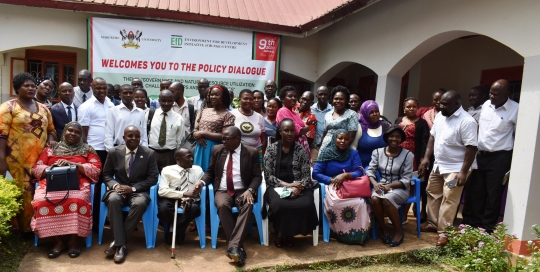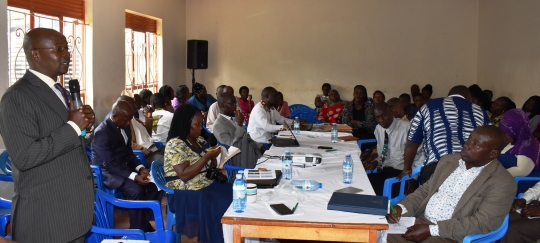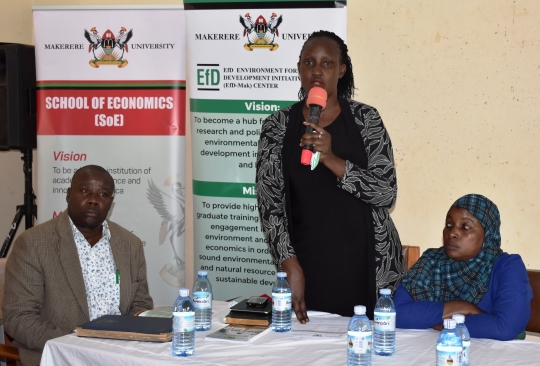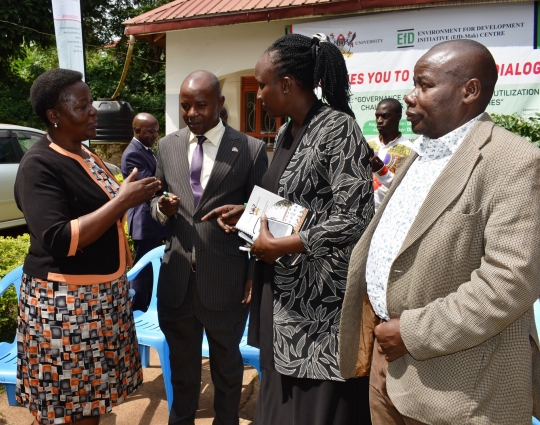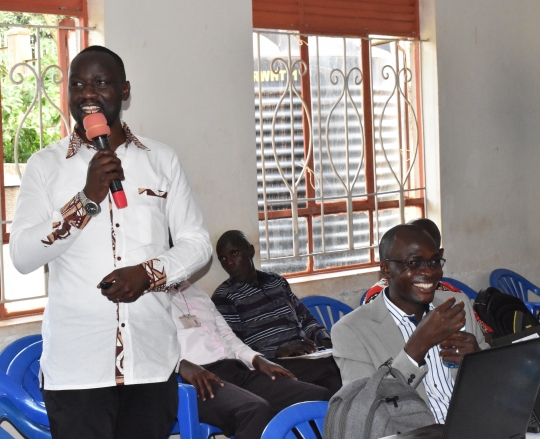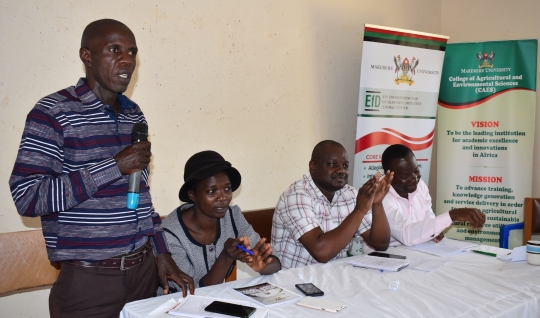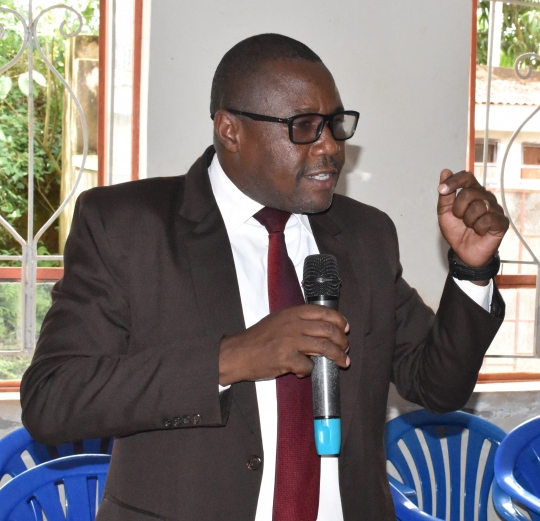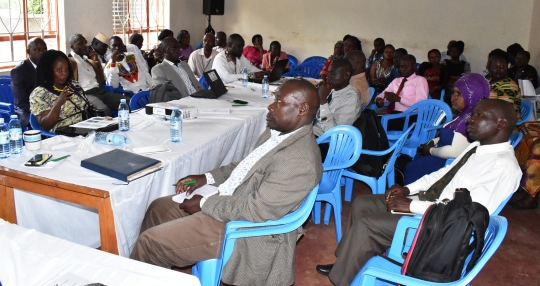Environmentalist and economists from Environment for Development Initiative (EfD– Mak Centre) set out from the Ivory Tower to Wakiso district headquarters to dialogue with the councilors on the governance and management of natural resources in the district.
The dialogue held on 9th January, 2020 under the theme, “Governance and Natural Resource Utilization; Challenges, Gaps and Opportunities” attracted district executives, (Chairperson for committees, town council chairpersons and clerks, sub county chairpersons and sub county chiefs, Municipality mayors, town clerks, physical planners, engineers, environmental and tourism officers and councilors from the district committee of Natural Resources.
The Director EfD-Mak Centre Prof. Edward Bbaale said the policy tour was a follow up activity of the initial dialogue held in November 2019 with government ministry officials, agencies, private sector and civil society that discussed some of the research findings the university had come up with that were important to government when implementing policies.
“We had that policy dialogue at Makerere University and thought that we must touch-base with local leaders in Uganda because they are charged with an oversight role over different natural resources.
Our objective is for us to come up with workable solutions that can accelerate the rate of growth of the economy without compromising the status of the environment.
For us in Makerere we are saying that let us work with environmentally friendly policies because this environment can be saturated.”, Dr. Bbaale explained.
The Director observed that despite the fact that Uganda has adequate laws, agencies, parliamentary committees on environment and natural resources, there are gaps in bringing empirical flavor into government policy formulation and implementation.
Prof. Bbaale said, the university has a team of highly qualified experts undertaking research in different sectors for instance the interaction between energy and environment, agriculture and environment, economic activities and forestry and economics and wetland interaction among others.
“We are undertaking research in different areas of environment and natural resources and coming up with real solutions for example the reason for cutting of trees is to obtain energy for cooking. We are saying there are alternative energy sources and technologies we can come up with to mitigate tree cutting.
As a center, we have solutions. The road is needed for the economy to grow but how do you do this by respecting this resource? How can we do the fishing while respecting that resource that is a habitat to our fisheries? that is why we are in Wakiso”, The Director stated.
Vice Chairperson Hon. Betty Naluyima (standing) making his remarks as the RDC looks on (L) and another councillor (R)
While officially opening the dialogue, the Vice Chairperson Wakiso District, Hon. Betty Naluyima decried the level of depletion of natural resources in the district.
“Wakiso environment has been depleted by the people of Wakiso and outsiders. The rate at which Lake Victoria is deteriorating is worrying. Uganda is blessed by nature but this has been taken for granted”. She said.
Hon. Naluyima observed that Uganda is refered to as the Pearl of Africa because of her good environment and not industries and development projects adding that the country cannot survive without mother nature.
Naluyima called for collective responsibility among all stakeholders to put into practice the good legislation.
“More than 50% of our population depend on agriculture and the environment. We need to work together to restore the environment. We should go back to the original stand in the Bible to tender the garden, if not, we shall continue suffering”, Hon Naluyima warned.
The District Natural Resources Officer Rebecca Ssabaganzi said the university was in the district to tease with them to have a policy dialogue on how the district can sustainably use the environment while upholding the development paradigm shift being faced in Uganda.
Ssabaganzi said Wakiso is one of the biggest districts with the highest population and a number of development activities taking place.
She said although the district is endowed with natural resources including lake and water resources, wetlands, forests, land, sand, clay, stones, minerals, wildlife, air, soil, the sun, human beings etc, the environment and the resources were at stake due to the high population and unsustainable use with land and water resources being big constraints needed for construction and development.
“Environmental degradation in Wakiso district is alarming for example the quarry site has not been restored, wetlands have been filled for construction.The oil spills on the lake resulting from the methods of sand mining and trucks has affected fish breeding and will cost us and generations to come. Fish stocks are lower and the population is not accessing the lake site,” the Natural Resources officer stated.
Ssabaganzi said, that the Ugandan population ought to understand that the natural resources base is kept for the good of Ugandans warning that unless there is a change of, “the I do not care attitude” the country will continue facing the impacts equally.
The constitution (eg Local Government Act, Cap 243; The National Environment Act, 2019; Forest and tree planting Act, 2003; Physical Planning Act, 2010 and the Wild life Act 1996 and many others mandates government to keep natural resources for the people of Uganda.
The National Environmental Act (NEA) of June 2019 provides under section 26 Environmental management by urban and district councils. Subject to this Act and any other applicable law, urban and district councils are responsible for the management of the environment and natural resources under their jurisdiction.
Ssabaganzi expressed the need for researchers and all stake holders to think of specific designs to cater for locations saying, in addition to having unemployed graduates and youth, many people sleep or work in Wakiso bringing many challenges in the use of natural resources.
“We have many graduates with no jobs who depend on the environment for survival. I am appealing for job creation opportunities that take on youth so that they can have the purchasing power. Courses at universities must tally with what the country needs out in the field”, Ssabaganzi advised.
She highlighted some of the causes of environment and natural resource degradation including un-harmonised laws (Water, Land, environment, Mine Act, Physical Planning), Limited enforcement and Low appreciation by the public that the resources are a public good with limited understanding and concern
Other challenges faced according to Ssabaganzi include non- functional environmental committees that used to be the eye to get information on environment activities, budgetary constraints and facilitation, inadequate staffing, vehicles and a manageable security force to work.
Ssabaganzi implored university experts to cover critical research gaps on natural resource management and utilization in the district to guide policy making;
She identified key research areas such as impacts of sand mining on lake ecology and fish stocks, Sustainable designs for use in shore lines; the soil suitability for various crops and sustainable utilization; contributions of the biodiversity to the economy; active ingredients in medicinal herbs , water quality aspects; data bases and biodiversity trends for tourism documentation; faster growth mechanisms for vital trees; contributions of species to the economy and impacts on soils and wetlands; Exploring uses of would be waste and access to technologies and empowering local contents.
Presenting on the “Evolution of Natural Resource Governance in Uganda: Implications on Sustainability”, Dr. Patrick Byakagaba, from the Department of Environmental Management Makerere University noted that Uganda is endowed with several natural resources that prompted Sir Winston Churchill to declare in his book -My African Journey, that Uganda is truly, “the Pearl of Africa.”
Highlighting Uganda’s five discernible periods with unique approaches to natural resource governance (Pre-colonial, colonial, post – independence, President Idi Amin and 1995 – to date), Dr. Byakagaba said, the governance of these natural resources has been defined by the socio- economic trends.
Dr. Byakagaba observed that the contemporary natural resource governance challenges include inadequate capacity to enforce legal and policy frameworks; asymmetrical power relations; inadequate support of lower level actors from higher level actors; poorly defined rights on natural resources and lack of clear and fair mechanisms for benefit sharing of natural resources held in trust.
Other challenges according to Dr. Byakagaba are political corruption; politicized public service; failure to integrate natural capital in national accounting systems; increased pressure due to national and global economic forces and failure to fully internalize the cost of using natural resources and, Fragmented nature of environmental governance.
The scale (institutional, jurisdictional, spatial and temporal, knowledge) blindness of environmental policies and laws resulting into limited cross- scale linkages, resigned citizenry and disempowered civil society, patronage relationships between the state and non-state actors, lack of enforceable regulations on natural resources on privately-owned land and Volatile Geo-political environment, resulting into influx of refugees are also to blame according to Dr. Byakagaba.
“Most challenges are residual impacts of failure to espouse the basic principles of good environmental governance, scale blindness and institutional and legislative fragmentation. Integrated decision- making can address most these of challenges.
The focus should be to have substantive integration to ensure that every decision includes a social, economic and environmental goal. This requires legal and institutional reforms that promote integrated decision-making”, Dr. Byakagaba proposed.
Dr. Byakagaba’s proposed policy actions entailed the promotion of inter-sectoral linkages and alignment of priorities, plans, budgets; recognition of the value of natural resources in National Accounting Systems and internalizing the full cost of using natural resources.
Other proposed policy actions by Dr. Byakagaba are the need to incentivize private sector investment in sustainable practices; providing fiscal incentives to promote adoption of energy efficiency and conservation practices; regulating conversion of natural ecosystems on privately-owned land, addressing lawlessness and political corruption and to ensure that policies, laws, guidelines are scale-sensitive.
The LCV Chairman Mr. Bwanika Matia Lwanga making his remarks
In his closing remarks, Wakiso District LCV Chairman Mr. Bwanika Matia Lwanga said the district was grappling with many disasters that are self-made. He cited flooding from River Mayanja as a result of encroachment and poor environmental practices for selfish gains and greed.
To Bwanika, environmental depletion is not caused by lack of awareness and ignorance nor poverty, if so, he apportioned the degree of these factors a 2-3%.
“We cannot claim that environmental depletion is caused by poverty or lack of awareness because the poor cannot afford the cost of refilling a swamp and construction. Researchers help us conduct comprehensive research into the root causes and solutions.
Those who deplete the environment are the elites, very rich and powerful normally highly connected who know that impacts are long term. Environmental degradation is not like malaria or cholera”, Mr. Bwanika asserted.
The Chairman also said degradation is not caused by the demand for agricultural land is so, this is minimal. He reasoned that there are big chunks of land that could be acquired for agricultural production in the country side but the rush is for free wetlands for investment.
Mr. Bwanika also attributed environmental degradation to primitive accumulation of wealth, deliberate and malicious damage, shameless theft, greed and abuse of power.
About Wakiso District
Wakiso is a local government, with four municipalities, nine town councils and six sub counties yet a rural district by categorization. It is centrally located implying spillover effects/impacts and a conduit to the center.
The population census of 2014 revealed 7% of the Ugandan population was living in Wakiso District whose population is currently at 2,007,700.
The district has a growth rate of 4.9% and the mean house hold size of 4.6 persons per house hold. The Greater Kampala Metropolitan area depicts and presents special urban challenges of this locality especially those related to infrastructure thriving on natural resources.
